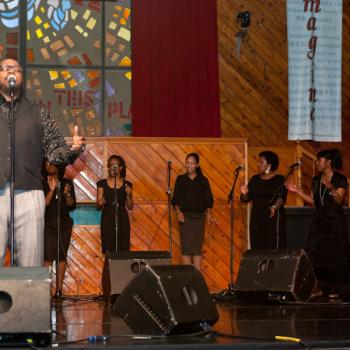Note: This article is part of a special Patheos Symposium, Passing on the Faith: Teaching the Next Generation. Read more perspectives here.
"What did you do at school today?" This and similar questions we ask our children in order to learn about their experiences points to a second technique that is at the heart of the Ignatian spiritual tradition. In Part 1 of this series, we focused on using imagination as a springboard for cultivating our children's spiritual lives. Here, we'll focus on reviewing the average day as another technique for filling out our children's spiritual vocabulary.
Why is it that dinner conversations frequently involve talking to our loved ones about what happened during the day? What is it about talking about past experiences that helps us form bonds of relationships? On some level all of us intuit a basic point: there is something about memory that is distinctive about the way we make sense of the world.
As parents, we have the power to help our children use memory to consider the meaning of their experiences, both good and bad. Consider the following questions, which you might use over dinner or (as we sometimes do) before bedtime.
What was something that made you happy today?
What was something that made you feel sad?
What are you looking forward to tomorrow?
These three simple questions can be a springboard for follow-up conversation: "Let's thank God for what made us happy; ask God to help us with what made us sad; and ask him to be with us tomorrow." And so on.
Saint Ignatius understood that memory serves to orient ourselves to the world, and that a true conversion also involves a transformation of the ways we remember our lives. He hinted at the vital role of memory in his Suscipe:
Take, Lord, and receive all my liberty,
my memory, my understanding,
and my entire will,
All I have and call my own.
You have given all to me.
To you, Lord, I return it.
Everything is yours; do with it what you will.
Give me only your love and your grace,
that is enough for me.
Of course there are different age-appropriate ways to encourage the practice of using memory in prayer. We've illustrated above a way that is appropriate for young children, but for older kids and teens one might instead converse naturally, asking (for example) where they found God over the course of the day. The Picturing God blog offers a number of examples, and many of the contributors point to an Ignatian practice of the Examen as helpful.
The Examen is the daily practice of prayerfully using memory. It helps a person become adept and finding God in all things, and bears fruit in finding God both in the past and in the present moment. It involves speaking to God as one friend speaks to another, then walking with God through the experiences of the past day—rummaging, to use a phrase from Dennis Hamm, SJ—to find what God wants to show us about our lives, our desires, and our decisions.
Children need Ignatian spirituality because it can help them learn the value of slowing down to take stock of what their lives mean. Many children today lead heavily programmed lives, limiting the time to develop creativity and independent thinking. It is good to teach them our language about God using traditional language-based methods (reading the Bible, learning our customs and beliefs, and so on)—but we suggest that it is also important to supplement those methods with encouraging exploration, reflection, and prayer. Every child learns differently and resonates with different ways of exploring the world. Encouraging your children to explore spirituality in this way may resonate with some children who less likely to sit down and read a Bible story. To the extent that we can encourage children to connect the word "God" with their very own concrete life experiences, we offer them an entry point into an expansive shared pilgrimage of faith.
Cultivating our children's memory also sets the stage for what is central—though often implicit—in Christian spirituality: namely, the shared memory of Jesus. Christian faith is rooted in memory, not philosophical abstraction: Jesus was a person who did and said specific things. If children become fluent in the language of memory, then they are likely to understand the significance of written memory in the scriptures. "Luke remembered Jesus this way." "John remembered Jesus this way." What emerges is a collection of memories that help shape the ways that we remember Jesus in practices such as the Eucharist.
In our third article, we'll return to this theme of memory by focusing on the stories that we tell children about Jesus: not only what they say, but how we might share them and invite children to be part of them.
8/19/2013 4:00:00 AM




